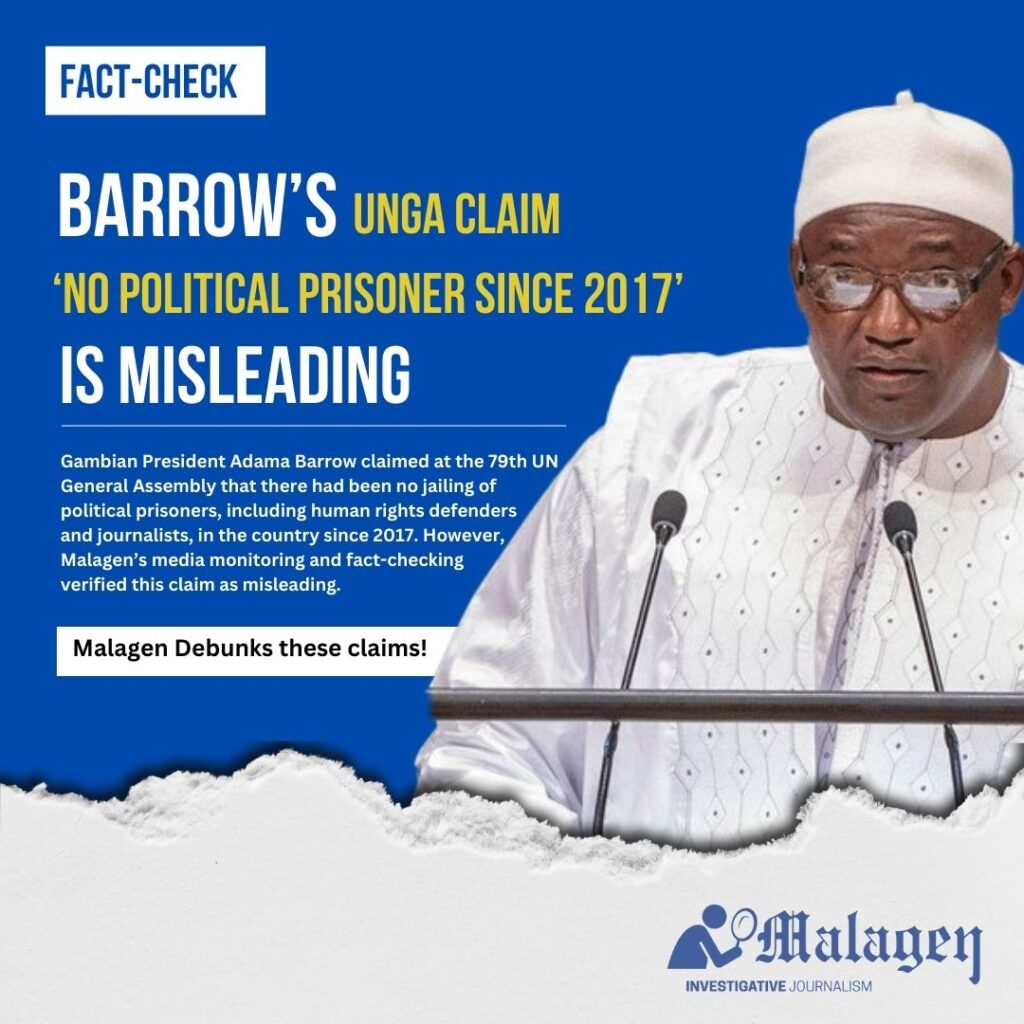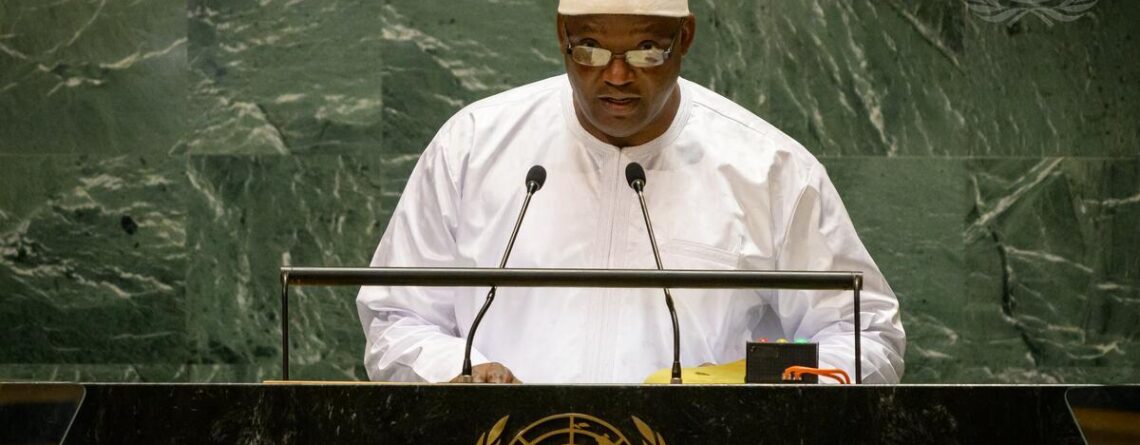President’s UNGA Claim ‘no political prisoner since 2017’ is misleading
Claim: No political prisoner, journalist and human rights defender had been jailed since 2017
Source: President Adama Barrow
Verdict: Misleading
Gambian President Adama Barrow claimed at the 79th UN General Assembly that there had been no jailing of political prisoners, including human rights defenders and journalists, in the country since 2017. However, Malagen’s media monitoring and fact-checking verified this claim as misleading.
The president made the claim during his UNGA speech delivered on Thursday, September 26 2024 held at the New York headquarters in New York, United States. On page 9 of the statement, he made the following assertions: “I am happy to report that, since 2017, The Gambia has neither recorded a single political prisoner nor has any journalist or human rights activist been jailed.”

Who’s a political prisoner?
To fact check this claim, several authoritative instruments were sourced to determine who or what constitutes a political prisoner.
Generally, a political prisoner is defined as a person imprisoned for their political activities, particularly those who oppose or criticize their government.
The Assistance Association for Political Prisoners (AAPP) defines a political prisoner as anyone who is arrested because of his or her perceived or real active involvement or supporting role in political movements.
According to the Human Rights Centre Memorial, a person deprived of liberty is unequivocally a political prisoner if any of the following criteria are observed:
1. The detention is solely due to their political, religious, or other beliefs, or non-violent exercise of fundamental freedoms guaranteed by international conventions.
2. The detention is solely for activities aimed at defending human rights and fundamental freedoms.
3. The detention is solely based on gender, race, religion, or other status, or due to their strong connections with communities united on this basis.
Furthermore, the guidelines of the Parliamentary Assembly of the Council of Europe (PACE) considers one to be a political prisoner if the persons’s detention violates basic guarantees in the European Convention on Human Rights, is imposed for purely political reasons, has disproportionate length or conditions, is discriminatory, or is the result of unfair judicial proceedings connected with political motives.
Factcheck – cases of political prisoners since 2017
Based on the above definitions of a political prisoner, Malagen revisited some of the arrest and detention cases involving political opponents, human rights defenders and journalists that occurred in the Gambia between 2017 and 2024 to verify the accuracy of the president’s claim.
Firstly, in February 2018, Dr Ismaila Ceesay, a political science lecturer and current information Minister, was detained for a day at Police Headquarters in Banjul and then charged with ‘incitement to violence’ for his comments about ECOMIG forces in the Gambia, “saying President Barrow needs to earn the confidence of the armed forces.”
In 2020, executive members of the pressure group ‘3 Years Jotna’ were arrested, detained and prosecuted on various offenses including unlawful assembly, riotous demolishing of buildings and rioting after proclamation.
In September 2023, the then UDP’s Campaign Manager, Momodou Sabally, (Now presidential adviser) and Nominated Councilor for Transportation at Brikama Area Council, Sheriffo Baiyo Sonko were detained and charged by the Gambian police. Sabally’s detention was in relation to TikTok video in which he said his party would take over the country in exercise of his political rights.
Journalists and human rights defenders face political persecution
On June 30th, 2020, human rights defender Madi Jobarteh was arrested and charged with ‘false information and broadcasting’. He had received information that he was under surveillance by the State Intelligence Agency (SIS). Madi was again arrested in November 2023 and charged with seditious intention. His arrests 2020 and 2023 followed comments he made critical of the police and of the president respectively.
Regarding right violation of journalists and freedom of expression in The Gambia, in its 2024 State of Press Freedom and Freedom of Expression report, the Gambia Press Union (GPU) documented that: “Journalists and media workers and human rights defenders have also faced arbitrary arrests by the police, detained incommunicado without access to family or lawyers with whereabouts unknown and in one instance physically assaulted while in custody, and released with or without charges.Incidences of physical assault on journalists and media professionals perpetrated either by the police or political party militants which occurred since 2017 have never been investigated, and no one is held accountable.”
During the period from 2017 to 2022, the Union has documented a total of six cases involving the arrest and detention of journalists, along with the arbitrary closure of two radio stations.
Last year, journalist Yusef Taylor, also known as Flex Dan, was held in custody at the Senegambia police station.
In 2020, the owner of Home Digital FM based in Brikama, Pa Modou Bojang, and the manager of King FM, Gibbi Jallow, and two of their employees were apprehended by the police, and detained.
In its State of Human Rights Report 2023, the National Human Rights Commission reported the arrest, detention and torture of Bakary Mankajang of ‘Mankajang Daily.
Currently, as we publish this report (On September 26th, 2024), two Gambian journalists are being subjected to police questioning at the Gambia Police Force headquarters in Banjul. They are Musa Sheriff and Justice Darboe, the proprietor and reporter of The Voice Newspaper respectively. Their detention came just a day after the legal team of President Adama Barrow wrote to them, demanding a retraction and public apology or face defamation lawsuits over an article purportedly revealing the President’s exit plan and the potential succession of GSM proprietor Muhammed Jah.
While none of these cases has led to the trial, conviction and imprisonment of any person, but the fact of their arrest and detention as politicians, human rights defenders and journalists tantamount the existence of political prisoners in the Gambia.
Verdict: This claim by the president is misleading.

